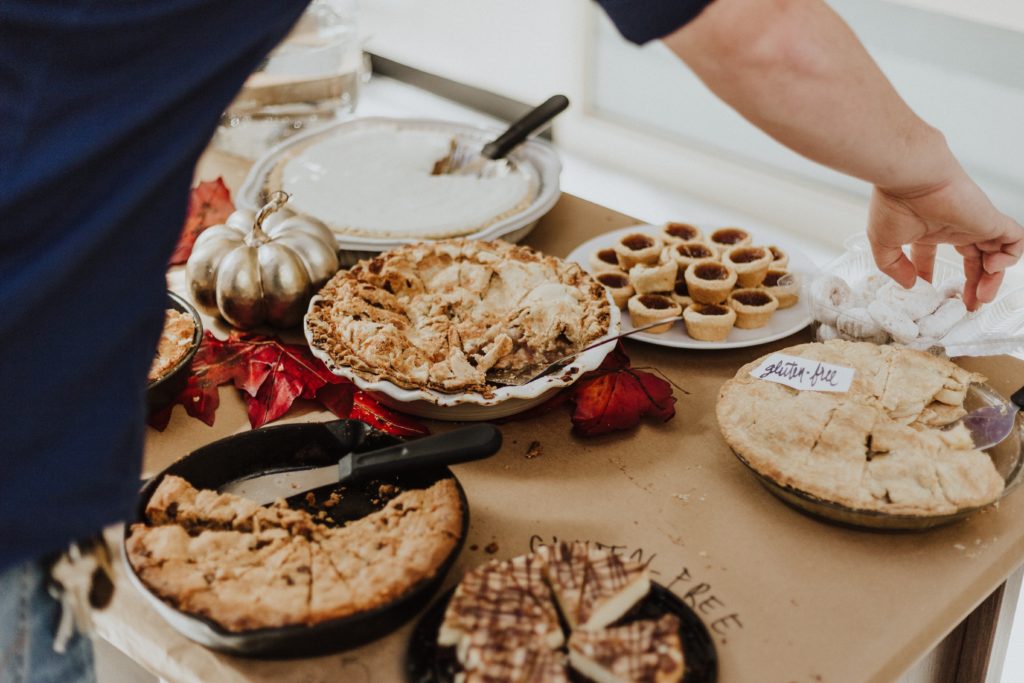All fields are required
Posted in Food Safety on December 1, 2018

It is that time of year again. Holiday potluck season! Whether sharable dishes or catered feasts, you are bound to be invited to some kind of soiree where food is involved – if not front and center. From the first Thanksgiving (politics aside) to the modern holiday party (religion aside), food is what brings us together. Sharing dishes and recipes. Catching up over baked turkey and ham. And desserts. You can’t forget about the desserts. While this life-long tradition likely involves home cooks dutifully chopping, boiling, broiling, and baking away in the early hours – to perhaps a lunch or dinner meal – to the eventual snacking and picking at leftovers throughout the day or night, food often sits too long on the table. Holiday Party Food Safety is a big deal this holiday season!
Here are a few tips to avoid the worst holiday faux pas, foodborne illness. Nothing says Happy Holidays like extended trips to the toilet and shared tummy trouble.
I shout this to the rooftops 365 days a year. A little louder for the people in the back. WASH YOUR HANDS! This is the simplest way to prevent the spread of illness, whether foodborne or otherwise. Wash your hands with soap and warm water before and after preparing food. Stop what you are doing and wash your hands after handling raw meat, raw eggs, or unwashed vegetables. These are the riskiest tasks in the kitchen. It really takes this one simple step to minimize risk of infection. It is a good habit to wash your hands before eating or drinking – just in case you might have come in contact with something. This will keep those nasty bugs from making their way from that door handle to your digestive system.
Certain foods like meat, poultry, seafood, and eggs most likely come to your kitchen already contaminated. While producers do what they can to minimize presence of harmful germs, you can stop them from making yourself or your family sick by simply cooking each food type to their appropriate internal temperature. This doesn’t mean cutting the biggest piece open and checking the color. Looks can be deceiving. Use a food thermometer and insert the probe into the thickest part of the meat. Refer to the following minimum internal temperatures to be sure you are fully cooking meats to kill any harmful bacteria.
Cue the Top Gun music. Just kidding. But the “danger zone” is in fact real, and is in fact dangerous. Bacteria thrive at room temperature. After food is cooked the rule of thumb is to keep hot foods hot and cold foods cold. Food should be refrigerated or frozen within 2 hours. This means for a holiday meal at noon sharp, leftovers should be safely stored below 40 ºF by 2PM.
Unpasteurized eggs, egg products, milk, and milk products are a danger. Particularly for dishes that call for raw eggs such as eggnog, tiramisu, Caesar dressing, or hollandaise sauce. Harmful germs may be present, and you would be sharing more than you family recipe for eggnog. The pasteurization process kills bacteria that might have contaminated the product before it even gets to your kitchen.
Dough and batter that are made with eggs or flour could have germs lurking inside. This goes for holiday favorites, such as cakes, pies, cookies, pancakes, biscuits, tortillas, pizza, crafts, and anything I might have left off the list that contains egg or flour.
Raw foods should be kept separate from ready-to-eat foods. Meat should be completely stored away from EVERYTHING else. Keep juices from meat, poultry, or seafood items from dripping onto other foods by storing them in containers to seal in anything that might contaminate your fridge. Eggs should be kept in their original container to prevent spread of Salmonella or other dangerous bugs that might make your family sick.
A big bird takes quite a while to thaw. Even a small one takes a bit longer than you might think. A turkey should be thawed either in the refrigerator, in a sink of cold water that is changed every 30 minutes, or in the microwave (if it will fit) on the defrost setting. Improper thawing will allow harmful germs to grow rapidly and increase the likelihood of making your whole family sick. You want the meal to be memorable. But not like that.
According to the Center for Disease Control and Prevention (CDC), pregnant women are 10 times more likely to get listeriosis, a deadly foodborne infection caused by the bacterium Listeria. Pregnant women should avoid certain foods to minimize risk of exposure to Listeria and other harmful germs.
Stay away from raw or unpasteurized milk and milk products such as soft cheeses (Roquefort, goat cheese, feta, Brie, and Camembert). The same goes for unpasteurized juice or cider. How about – avoid ANYTHING unpasteurized.
Use caution with seafood. Unless in a cooked dish such as a casserole or canned and shelf-stable – do not eat refrigerated or smoked seafood. If not handled appropriately, harmful germs might escape the smoking process and infect an expectant mother.
Who spiked the punch? Watch out for holiday beverages that might contain alcohol. It is a good practice to avoid eggnog all together unless you are sure that it contains no alcohol and it is either pasteurized or made with pasteurized eggs and milk.
Enjoy the Most Wonderful Time of the Year
Whether it is Thanksgiving or Holiday meals are your fave, if you play it safe you can enjoy the “most wonderful time of the year.” Did I mention wash your hands? I will say it again. Wash Your Hands!
By: Heather Van Tassell, Contributing Writer (Non-Lawyer)